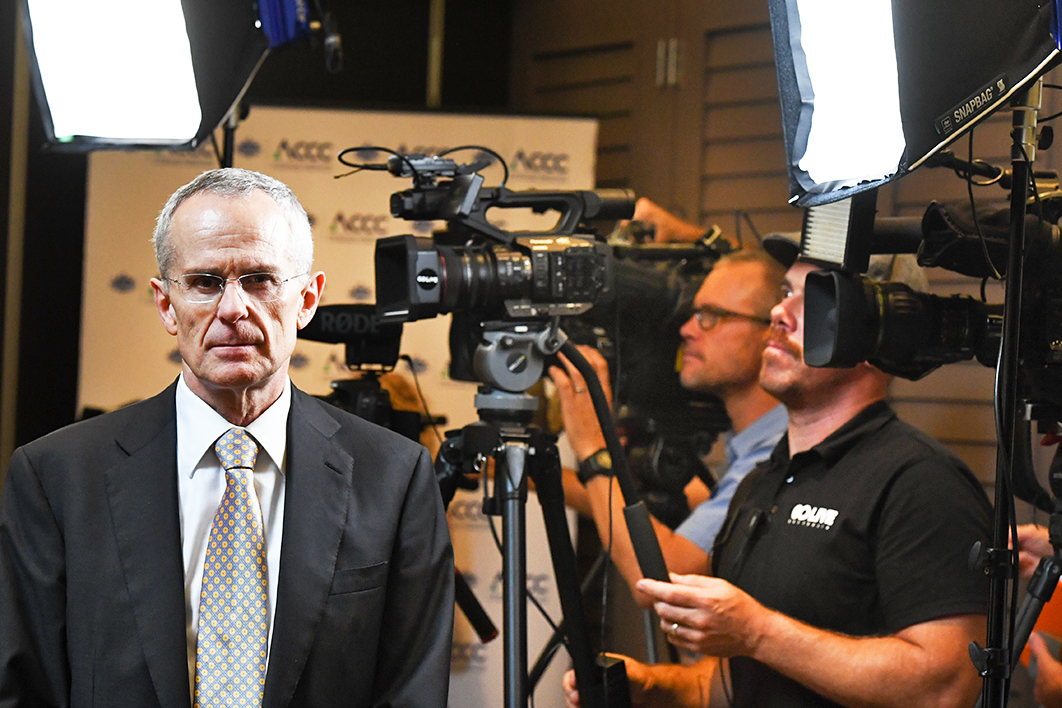The Australian Competition and Consumer Commission’s Digital Platforms Inquiry, which released its preliminary report yesterday, could be a game changer for journalism and media regulation in Australia. It is also of international significance: the ACCC has signalled its intention to work with the OECD and other international agencies to kickstart an international law-making effort to regulate Google, Facebook and their successors.
If this path is pursued, it could dramatically change how the digital media are shaping politics, society and democracy. It could match the mammoth effort that resulted in our system of copyright regulation.
But this is a big “if,” and success depends on whether the ACCC sticks to its guns and governments have the will to act. On the latter, recent history doesn’t inspire confidence.
We are, the ACCC says, at a “critical time… Digital platforms have fundamentally changed the way we interact with news, with each other and with government and business.” The ACCC comprehensively rejects the disingenuous claims of Google and Facebook that they are neither publishers nor media companies, but simply technology companies. Google and Facebook have used this fig leaf to avoid any suggestion, worldwide, that they should accept the responsibilities and regulations that usually apply to media.
The ACCC says that they are, in fact, much more than distributors
Digital platforms actively participate in the online news ecosystem by performing a wide range of functions other than news referral services, some of which overlap with the functions of media businesses. This means that digital platforms are considerably more than mere distributors or pure intermediaries in the supply of news and journalistic content in Australia.
Google, says the ACCC, is attempting to position itself as “the source of all information, and for news stories… an intermediary between consumers and providers of news and journalism.”
Dealing with Google and Facebook is more or less compulsory if news media companies want to reach audiences, says the ACCC. Yet the two giants also make it much harder for media companies to make money from journalism.
Traditionally, we have not looked to the ACCC — the ultimate dry-as-dust market regulator — for an understanding of hard-to-measure things like the civic importance of journalism. In its history of scrutinising media mergers, it has tended to talk of dollars, cents and markets for advertising, and little else.
We saw a change (though sadly with little effect) in the ACCC’s recent scrutiny of the Nine–Fairfax merger, where the talk, for the first time, was of the “market for news and information” — a concept dizzyingly close to the “market for ideas.”
In this report, the theme swells. The ACCC gets how journalism matters, and it understands the profound impact Google and Facebook have had. “News and journalism generate broad benefits for society through the production and dissemination of knowledge, the exposure of corruption, and holding governments and other decision makers to account,” it says, before drawing on the academic and industry literature to parse the different kinds of journalism and their importance to the public interest.
The report contains alarming data on the shift of advertising revenue from print media to online, and the losses of journalistic jobs that have resulted. Revenue from journalism began to fall in 2001 as classified advertisements became unbundled from the physical artefact of the newspaper. That transformation was completed more than a decade ago, but news media revenue has continued to decline. The report contains a particularly striking graph showing print media advertising dropping off a cliff in 2014.
Data provided to the ACCC by media companies show that, compared with 2014, there are now 20 per cent fewer journalists employed in what were once newspapers and are now print and online news media companies. That is a dramatic change to a key component of our democracy. And this has happened, as the ACCC notes, when the country’s population and economy have both been growing strongly.
While the new web-based entrants to news media — such as the Guardian Australia and BuzzFeed — have made important contributions to diversity, they have not gone close to offsetting what has been lost. According to the ACCC, six of the larger “digital natives,” with a combined audience of close to five million, collectively employ fewer than 250 full-time editorial staff. None of them reports local news.
The inevitable result, says the report, will be a reduction in public interest journalism. This has big implications. “Even those members of the public that do not read, watch or listen to the news benefit from the role journalism performs in exposing corruption, the creation of public debate and holding governments, corporations and individuals to account through their questioning and investigation.”
Within this changed media landscape, half of all traffic to news websites comes from either Google or Facebook, giving the two behemoths a potentially crushing market power. Says the ACCC: “While the digital platforms clearly value the news media content which they are able to display to their users, Google and Facebook each appear to be more important to the major news media businesses than any one news media business is to Google or Facebook.”
A key concern is lack of transparency about the algorithms that govern which citizens receive which news media content in their feeds. This means false news, political manipulation and “filter bubbles,” in which extreme opinions and tainted news are served to those most likely to seize on them, can all grow without society being able to counter or even scrutinise them.
So what does the ACCC recommend be done about this?
First, it suggests a change to merger law that would allow it to prevent Google and Facebook from gobbling up potential competitors rather than only those companies that already compete with them.
More significantly, it recommends a new market regulator with the power to investigate and demand information, including on those all-important algorithms that govern what news we read.
Finally, the ACCC recommends a separate, independent and comprehensive review of media regulation with the aim of designing a new framework of platform-neutral, modern and fit-for-purpose media regulation.
At this point in my reading, I felt like cheering. But it takes us back to that big “if” in my introduction. Will governments act? Will this report join the many others that have fallen into the dust?
The report lists more than thirty inquiries into aspects of the media and its regulation conducted by Australian governments and parliaments over the past twenty years. Most have done serious work and issued serious recommendations, only to be comprehensively ignored by governments lacking the political will to take on media barons.
Highlights (or lowlights, depending on your point of view) include the Convergence Review in 2012, the Finkelstein report into news media regulation, also in 2012, a brace of reports by the Australian Communications and Media Authority, and more recently the report of the Senate Committee into the Future of Public Interest Journalism — which was already something of a zombie before it reported because its prime movers (Nick Xenophon, Sam Dastyari and Scott Ludlam) had trouble staying in parliament.
The last of those reports was one of the prods for the current ACCC inquiry, which began in December last year. And the ghosts of these previous inquiries live on in the ACCC report, which references them, picks up on key recommendations and pushes forward.
For example, the ACCC wants the new system of regulation of Google and Facebook to apply to all digital platforms that distribute news and media content and earn more than $100 million in the Australian market. The late, lamented Convergence Review — ignored by governments after its release in 2012 — also recommended a revenue-level determinant for who gets regulated, rather than the outdated platform-based approach.
The ACCC also foreshadows the issues it is considering making recommendations on in its final report, due in June next year, on which submissions are invited. Among these are the recommendations of the Future of Public Interest Journalism inquiry for news subscriptions to be tax-deductible for all consumers, and for investment in journalism to attract tax offsets.
Oddly, the report doesn’t pick up on the suggestions that donations to not-for-profit journalism enterprises be tax-deductible. While the report notes the impact of philanthropy and crowdfunding on journalism, it neglects this aspect. It does express a preference for tax measures to assist journalism, rather than direct grants or subsidies from government — though it says it welcomes submissions on grants as well.
And it signals a review of the regional and small publishers innovation fund — which was a $16 million sop government gave to publishers in the wake of removing restrictions on concentration of ownership. The ACCC basically wants to know whether this has worked, and whether it should be continued.
For what it is worth, my sources suggest that while the cadetship and scholarship parts of the program are valued, the innovation fund is so restricted in its requirements that it has failed to attract many applications. Publishers can apply for “efficiency measures, digital projects and revenue development projects” but not for what is most needed — a reporter or two to sit in court, get to the school fete or attend the local council meeting.
Meanwhile, the ACCC report suggests that any benefits under new tax laws be confined to journalism enterprises that meet certain standards. Pushing this idea further, it says it will consider recommending that Google and Facebook be required to badge news media content that comes from organisations that have signed up to standards and journalistic codes of practice. This is a ghost of some of the suggestions in the Finkelstein inquiry.
Combined, the tax and “trust badge” measures suggest that the Australian Press Council might get a fillip to its membership. At present, not all the new entrants to the media market have signed up. If the ACCC pushes through with these suggestions and they are adopted, the benefits of signing up to industry self-regulation schemes will include a badge of trustworthiness on Google and Facebook, and access to tax breaks.
There is much more in this report, and in accompanying documents that contain ACCC-commissioned research on how Australians are accessing news media and what they value. This is valuable stuff.
Some snippets: Just over half of Australians believe the news they consume is trustworthy — but only 36 per cent think that the news other Australians consume is trustworthy. The things that most build trust in news outlets are accurate reporting, reporting that is neutral and unbiased, and independence from political and government interests. Public broadcasters are also likely to be trusted. Less important in building trust was familiarity with the journalists employed by the outlet.
Other dismal figures include the fact that three-fifths of Australians don’t pay for news in any form, and most of these say they won’t pay for it in the future. This is where a tax deduction might make a difference.
On the upside, over three-quarters of Australians believe news services are important to them for engaging in Australian society. They value national and local news, and news about politics. The most valued categories of news include health; the environment; science and technology; crime, justice and security; Australian politics; news about particular industries; and “news of the day.”
The report also looks at privacy and how much consumers know and care about the data that Google and Facebook collect and hold about them. Here I have concentrated on the implications for news and journalism. And that leads back to the question of what will become of all this work. What can we expect of whichever government is in place when the final ACCC report hits in June?
The current communications minister, Mitch Fifield, has been at the centre of the leadership disruption that has crippled the current government. During his term he has continued the trend of removing outdated regulations without apparently considering that something more up-to-date might be needed to replace them. He has also been responsible for the “captain’s picks” that left us with an ABC board that lacks legitimacy. It would be astonishing if he had much headspace or political will left for taking on Google and Facebook.
Meanwhile, the shadow minister for communications, Michelle Rowland, is believed to be trawling among academics and others for policy ideas. The ACCC has given her plenty to chew on, but she is not a senior player in what is likely to be the incoming government. The ACCC report calls for a new regulator and a comprehensively new approach to media regulation, plus tax measures and participation in an international effort. If this is to come to anything, the most senior levels of an incoming government will need to get on board. •
Declaration: Margaret Simons made a submission to the ACCC’s Digital Platforms Inquiry and was consulted by inquiry staff. Her submission, submissions she authored to previous inquiries and some of her academic publications were cited in the preliminary report. She is also active in a number of associations that lobby on issues concerning the future of public interest journalism.




